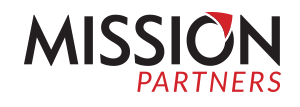The Words Matter
By Elena Hilton
One of my favorite movies of the past few years is Arrival, which stars Amy Adams as a linguistics professor who’s recruited to figure out how to communicate with aliens that have landed on Earth. I’m not one for sci-fi stories, but as a writer, I love how the movie centers on the role that language and communication play in expressing who we are, how we think, and how we view the world. Words are more than just letters strung together. They shape our ideas, how we process information, and how we form judgments. And they are among the most powerful tools we have.
During my first month at Mission Partners, I took part in Mission Forward’s Race and Identity Training. I learned so much valuable information during that one-day session, but the activities around equitable and inclusive language stood out to me most. Prior to the training, I thought I had the tools to incorporate equity into my work, but it’s less about knowing everything, and more about continuing to learn and question the systems as I know them. In the workshop, we addressed our own identities, where we hold power and privilege, and where we are often pushed to the margins. My identity as a white woman in the United States allows me certain unearned privileges because of my race, while my gender means I must navigate the effects of sexist cultural values and policies.
To that end, I wanted to share some tips I took away from our Race and Identity training, and continue to use in my day-to-day work at Mission Partners. Hopefully they will spark some a-ha moments for you, too:
- Labels don’t apply to everyone.
Our brains are constantly searching for ways to categorize information through labeling, but certain words and phrases that might be embraced by some, could be shunned by others. When thinking about how to describe individuals and communities, it’s important to remember there are no “one-size-fits-all” labels. As a white woman, the most important thing I can do is ask, listen, and research, because my identity means there are many community experiences I don’t know firsthand. When discussing communities, I make a concerted effort to determine how those communities refer to themselves. When discussing individuals within communities, I’ve found the best course of action is to ask what terms they’re comfortable with, listen, and adapt to people’s preferences.
- Think twice about the word “empower.”
“Empower” seems like a bold, positive word, doesn’t it? I definitely thought so, but during Mission Forward’s Race and Identity training, I learned to think about it from a different perspective. When we say an organization or a movement is empowering people, what we’re really saying is that those individuals don’t have power or agency on their own and require help from outside forces. Of course, that’s not true. Instead of using the word empower, consider using “support,” “offering tools,” or “working together to achieve a goal.”
- Say what you mean.
Racially-coded language is embedded in so much of our day-to-day communications, you might not even realize how certain words have contributed to bias and discrimination. When writing, take a step back and think about what your words imply, paying careful attention to common phrases. One of the most commonly used terms when talking about young people who live in under-resourced communities is “at-risk.” Ask yourself, at-risk of what? Living in a certain area doesn’t make you a risk. A young person living in an under-resourced community shouldn’t feel like they are to blame for the institutionalized barriers impacting their life.
Don’t be afraid to call out systems of oppression. A word that gets avoided a lot is racism, especially in reference to statements made by people in positions of power. If something is racist, say it’s racist. Don’t say it’s “racially charged” or “inappropriate.” In fact, many news outlets, such as NPR, have explained their decision to label some of President Trump’s tweets racist. By explicitly calling out racist tropes, NPR listeners who weren’t familiar with the history of the phrase “go back where you came from” had an opportunity to learn. So, let’s call racism what it is so we can work to address it by offering solutions on how we can move towards combating it.
If you, like me, are always searching for ways to make your communications materials more thoughtful and inclusive, I’d encourage you to check out this resource that’s been enlightening for me: SumOfUs.org’s Progressive Style Guide.
- When in doubt, use statistics.
Data is your friend—when used correctly. Words alone pose a challenge in crafting a complete, accurate narrative. “Aggregating” data by lumping groups together usually is not the right course of action, as it can erase identities. For instance, think twice before saying you have statistics on “Hispanic women.” Categories like this are typically far too overarching and likely can’t fully depict the individual cultures and backgrounds that fall within them. Disaggregated data ensures that people in communities are not viewed as a monolith.
To offer some ideas, data points and research could be used to dispel the myth that the racial wealth gap is the result of individual actions. Or you could use data to show how racism causes higher Black maternal mortality rates and many other health-related problems. Just keep in mind that research, like language, can hold biases based on how its compiled, so do your due diligence to ensure the statistics and data at hand aren’t worsening or ignoring existing disparities.
- Use people-first language.
The simple way you place a word to either be an adjective or a noun can make all the difference in how your audience thinks about the person you’re describing. Instead of saying “homeless person,” reframe your syntax to say a person experiencing homelessness. Instead of “foster child,” say child in foster care. People are so much more than their situations and environments.
- Continue learning.
What I am learning here at Mission Partners is using equitable and inclusive language doesn’t happen without effort. It requires an intentional commitment to continually learning about intersectionality and applying that knowledge on a daily basis. Above all else, know that communication has the power to shape our thinking and our culture at large. When you mindfully choose inclusive and equitable language, you’re helping to encourage a more inclusive and equitable world.
Interested in learning more about how you can bring equity and inclusion to the forefront of your work? Reach out to us for a cup of coffee, or join us at Mission Forward’s next Race and Identity Training on December 11.




 Check out our new
Check out our new